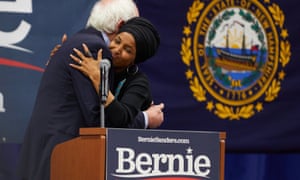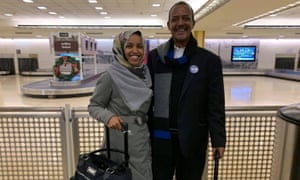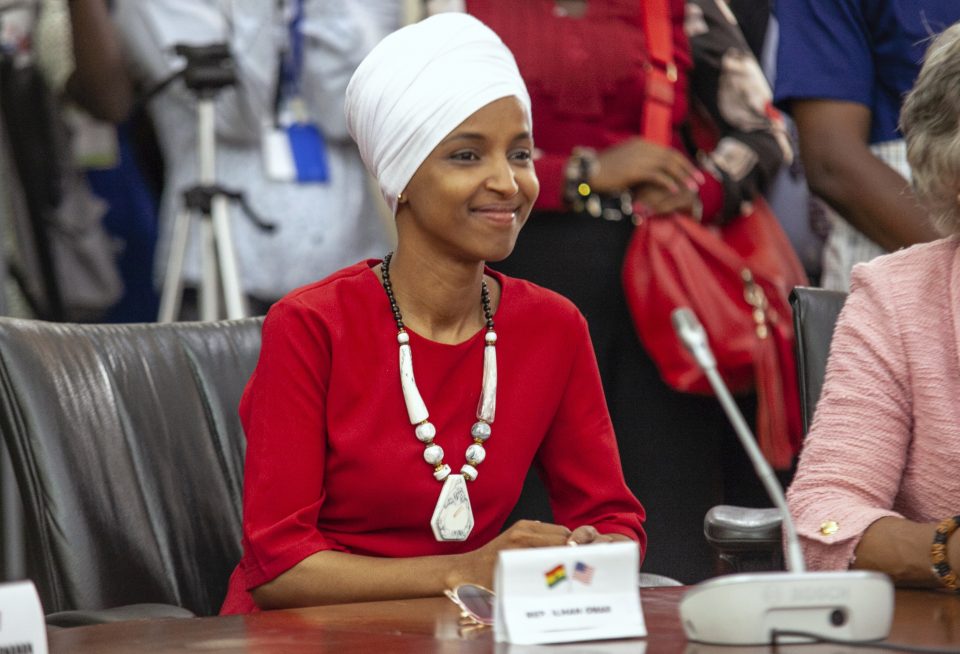‘I never feel afraid’: the Congresswoman in her Longworth House office. Photograph: David Butow/The Observer
Interview
Ilhan Omar became a national figure in 2018 as one of only two Muslim women ever elected to the US Congress. The Somali-born politician tells Rachel Cooke about growing up a refugee, being the focus for Republican rage – and standing up to Trump
Longworth House, which stands just south of the Capitol in Washington DC, is one of three offices used by members of the House of Representatives. A vast neoclassical building, its corridors are austere, their anonymous expanses broken only by American flags and identical brass plates identifying which Congressman or woman may be found behind each door. Turning a corner, however, something else suddenly appears on the horizon: a multicoloured cloud of butterflies that turns out, on closer examination, to be a collection of hundreds of Post-It notes. “Thank you for being strong,” says one. “You’re the best of what America can be,” says a second. A third, heart-shaped and embellished with a smiley face, announces simply: “You are home.” Almost, but not entirely, obscured by this outpouring of love is another regulation brass plate. This one reads: Representative Ilhan Omar, Minnesota.
Even by its own standards, the atmosphere in Washington this afternoon is febrile. Yesterday, the articles of impeachment against President Trump were finally brought from the House to the Senate. Meanwhile the two leading candidates on the left in the race to be the Democratic presidential candidate, Elizabeth Warren and Bernie Sanders, had a very public falling out, the former having accused the latter of calling her a liar on live television.
Outside, news crews seem to be around every corner. But to meet Congresswoman Omar, you would never know all this. Amid the noise and excitement, she is an unexpectedly still, quiet point. In her office she sits, tiny as a bird, hunched over a cup of soup, as if this was just another ordinary day.
Does it feel slightly unreal to be here at such a highly charged moment? Omar smiles. “Many of the plot lines in my story feel preposterous at times,” she says, wiping her mouth with a napkin. “Maybe that’s why I’m so drawn to watching dramas that are over the top. It’s more bizarre than House of Cards. But my situation is also an example of how two contrary narratives can co-exist. We live in a time of hopefulness, with so many firsts, yet we can also be in complete despair, a tyrant in the White House.”

Her serenity – minutes can tick by before she answers a question – comes as a surprise at first. You expect fire. After all, since her election to Congress, when she became not only the first representative to wear a hijab on the floor of the House, but also the first naturalised citizen from Africa and one of the first two Muslim women to serve, controversy has trailed her almost unceasingly. She’s a member of the so-called Squad, a group of four women elected to Congress in 2018 (the others are Ayanna Pressley, Rashida Tlaib and Alexandria Ocasio-Cortez) who are pushing for such progressive ideals as the Green New Deal, a Democrat-sponsored resolution that aims to address climate change and economic inequality, and Medicare for All, in which universal healthcare would be funded by taxation. On the left of the Democratic party, she often draws the ire of her own side as well as that of the right – particularly when it comes to Israel.
Last February, for instance, the Democratic House leadership accused Omar, who is critical of Israel and a supporter of the Boycott, Divestment, Sanctions (BDS) movement, of having engaged in antisemitic tropes; she later apologised, and thanked Jewish colleagues for their efforts to “educate” her. Nevertheless, it is from the Republican side that the worst abuse comes. Last year, the campaign Twitter account for Danielle Stella, a Republican who hopes to unseat her in Minnesota, posted two messages suggesting she be tried for treason – alleging she had shared sensitive information that found its way to Iran – and hanged. On social media, the rage against her never lets up. No wonder her staff are reluctant to take down the adoring Post-It notes left by more supportive visitors – by those who regard her as a symbol of hope and American diversity – for all that the Capitol Hill authorities have quietly asked them to.
Did it feel historic to vote to send the articles to the Senate? “It did. We have a corrupt, lawless president who has subjected the American people to a great deal of harm and this is our opportunity to uphold our oath of office.” She believes that the impeachment is the morally correct course of action for Democrats, irrespective of whether Trump is acquitted or of its potential effect on the presidential election later this year. “As the Speaker said, this is the highest form of patriotism. It’s not about partisanship. It’s about protecting the Republic.” All the same, does she worry that it might ultimately boost Trump? She shakes her head. “This is country over party, regardless of what the retributions might be for us.”
As a supporter of Bernie Sanders, what does she make of his spat with Warren? “It’s not about leaders, it’s about ideology,” she says. “I’m someone who is interested in policies, not identities.” Like Sanders, she is in favour both of cancelling outstanding student debt and free tuition for college students from low-income families; of reform of the private prison service; and of the automatic registration of voters when they turn 18. And both are opposed to the sealing of the US border with Mexico, and in favour of a more liberal immigration programme generally. (Though they differ when it comes to foreign policy, Sanders having suggested he would not cancel the US drone programme.)

Will he win the candidacy? “I believe he will.” And if he does, can he really beat Trump? It’s not only that some Americans regard Sanders as a communist. Omar followed the British general election closely, for which reason she must know that all the evidence suggests the question of leadership does matter, in the end.
But she won’t waver. “Yes. The policies we are fighting for, contrary to what the right says, are supported by the majority of Americans. In our battleground states, Bernie speaks to the mother who is working three jobs and barely able to put food on the table; to the woman who wants to start a family or a business, but is shackled by student debt. I’m confident people are going to be for Bernie, because they know he sees them and hears them and will make their lives better. He has an ability, unlike anyone else, to organise a multiracial, multifaith, multiclass movement.” Still, better any Democrat in the White House than no Democrat, she says. Ultimately, whoever runs will have her support.
Watching Omar on CBS’s The Late Show last April, resplendent in huge yellow earrings – under questioning, she apologised again for her comments about the Israel lobby; like many people, she said, she didn’t always fully understand the historic context of certain words and the pain they might cause – I was vaguely amazed by her star power. Her words were politician-careful, almost to the point of dreariness and yet, somehow, she dazzled. What’s her secret?
In person, you quickly grasp that her fearlessness is the key. In Britain, politicians complain loudly about the hate they receive. But when I ask her about the trolls and the threats, about what it feels like to be such a lightning rod, her attitude is almost blithe. Yes, when Trump tweeted last summer that the Squad, all of whom are women of colour, should “go back” to “the places from which they came”, there was an alarming spike in the online attacks against her; she continues to receive a “tremendous amount” of hate mail. But when she insists it doesn’t make her feel vulnerable, that it causes her only to worry about how it “impacts on those who inhabit the same identities as me,” I find that I believe her.
Where does it come from, this stubborn sense of purpose, this refusal to flinch in the face of a fight? Last week, she launched her campaign for re-election with the slogan “Send her back to Congress”, jokily taunting Trump by playing on his tweets about her. She traces it to her childhood. “At a very young age, I was made to believe I had a role in creating my own destiny,” she says. “I was a tiny kid, but I always refused to acknowledge this. I believed I was somehow both bigger and more invisible. What happened was that my father’s father would call us into his room before school, and he would say we were Arawelos. Do you know who Arawelo was? She was, some say, a mythical queen: small in stature, but mighty in the way she ruled. There is a grave in what is now Somaliland: the women throw flowers at it and the men throw rocks.” She laughs. “What’s funny is that my sisters and I each thought we were the only one he said this to, so I walked around for my entire life thinking I was the special Arawelo in the family until three years ago, when I told this story on a panel, and my sister said: ‘Stop lying, that was me.’”

Her mother died when she was two and she was brought up by her father and grandfather, both of whom had forward-thinking ideas about the raising of girls. She believes now that the latter, in particular, hoped to ignite an interior fierceness that would help her to face inequality later on – and as it turns out, he was successful.
“The fact I truly never feel inferior in any way, or afraid in any situation, has always been baffling to people,” she says. “I would stand up to boys who were bullying, not even me, but other kids. They would laugh, and say: ‘Who do you think you are? We’re going to beat you up after class’ – and I would actually show up for the fight. So yes, I think the reverse psychology that my grandfather engaged in has paid dividends.”
Omar was born in Mogadishu, Somalia, the youngest of seven, and thanks to this, war is not an abstract concept for her. Following the assassination of Qassem Suleimani in Iran last month, she stated publicly that the escalation of tensions between the US and Iran had triggered her post-traumatic stress disorder – a comment one Republican denounced as “offensive to our nation’s veterans”. But she’s not about to go back on what she said.
Why would anyone want to deny her experiences? “I understand how quickly a society can deteriorate,” she says, softly. “There are other Congress members who know what it means to live under an oppressive regime, and who, as children, fled conflict. But I’m unique in being a Representative who lived through active war and who remembers the destruction.”

It’s this that, at least in part, lies behind the progressive foreign policy ideas she hopes to announce in the coming weeks, a package that will include the prohibition of arms sales to countries that cross humanitarian red lines and a demand that the US ratify the UN Convention on the Rights of the Child.
What does she remember of the war? “I remember it in moments. I vividly remember the first sounds of gunshots through concrete walls. I would have been eight. I remember the distinct noise that a rocket makes as it flies over your home. I remember the desire to escape your own body as you hid under the bed, not knowing whether that rocket is going to hit your home. When the war began, we lived between the rebel forces and the regime. I was truly caught up in the crossfire and our home would ultimately be hit by rockets multiple times. I lived through an invasion of militia men into our home.” She lost no one close, but several people in her wider family were killed.
The family fled to a refugee camp in Kenya where they remained for four years. “I have memories of arriving there, too. One thing that has stayed with me, and which helps guide my advocacy now, is that I remember what a relief it was to show up there, to receive water and blankets – and as a kid in the open field, as people are being processed and assigned tents, you get to roam. When I see images of kids in cages at our border [with Mexico], I know their mind is not getting the break that mine got; that moment of feeling like their childhood is being restored to them, when they’re allowed to play. The process we are putting children through is retraumatising.”
Did the camp come to feel like home? “It did, to the point where I protested about leaving – something my family made fun of me for. You get into a routine and for someone like me, who’d grown up in a very protected environment, watched over in a big family compound, there was lots of new freedom. The rules shifted. When you’re little, you can get away with a lot; you can sneak off. To run around between tents, to stand in line for water, to have the ability to move and to be trusted, was one that I adored. So, the restart wasn’t something I looked forward to. When everything you know no longer exists, and you’ve created a new reality, to do it again… that was hard.”
Her father decided the family would seek asylum in the US; having been a teacher trainer in Somalia, he would make his living in Minneapolis as a cab driver and working for the post office. She was 12 when they arrived, and 17 when she became an American citizen. “My dad is ever the optimist. It’s hard to see his smiling face and to imagine what he survived. The yearning for home never goes away. But it’s a lot easier to come to the US and have the opportunity of a start than it is to stay in a refugee camp, in limbo. The challenges were really all mine.”

She hated not being able to speak English. “In effect, you’re rendered mute. It was lonely and maddening. I have moved my own kids around a few times [a divorcee, she’s been married twice and has three children by her first husband. Last summer, the rightwing press gleefully reported that she was having a “secret affair with a married aide”]. When they used to complain about it, I would say: ‘Imagine doing that in a new culture, with no acknowledgement of your faith, and no ability to communicate.’ It’s a good disciplinary tool. Kids like mine can’t complain because their mothers will always go back to their refugee stories.”
Was this new world racist? “I grew up in a black world until I was 12, so I’d never even had a conversation about being black – and even in Kenya, people were predominantly Muslim, so that wasn’t talked about either. So arriving in the US was brutal, yes. Not only was I made aware that I was black and Muslim; I was also a refugee and a female. But being Muslim was the thing about me that was really noticed. Wearing a hijab was an odd thing. The other kids called it out, because that’s what children do. I was made aware that I was not normal. I realised discrimination was part of the system.”
Nevertheless, she thrived. She read political science at university in North Dakota, after which she worked in child nutrition back in Minnesota. Having managed the campaigns of other local politicians, by 2016, she had been elected to the Minnesota House of Representatives herself, challenging an incumbent of 44 years; two years later, she stood for Congress. “I think it speaks to something the people have acknowledged,” she says, of her resounding victory in that election. “By sending me to Washington, they’ve established a counter-narrative; I am an antidote to the rhetoric of Trump. That we have come into the ring is a loss for him, not for us.”
She’s proud of what she has achieved. She is still only 37, after all. She sees the miracles here. But she’s cautious, too; resolute. “This is a place that is designed to mould and change you. Except, we don’t want to be changed. We want to change it – and we have.” As one aide begins knocking at the door, and another begins gesturing for me to wind up, her hands go to her scarf. “There is room here for a hijab.”
How high does she want to go? Where does her ambition end? She says something pat about living in the present, but looking at her face, I can’t help but notice that, just for a moment, she seems suddenly coy. “We can be as bold and courageous as we want,” she says, in the seconds before she darts from the room. “We have… opportunities.”
Via-The Guardian


